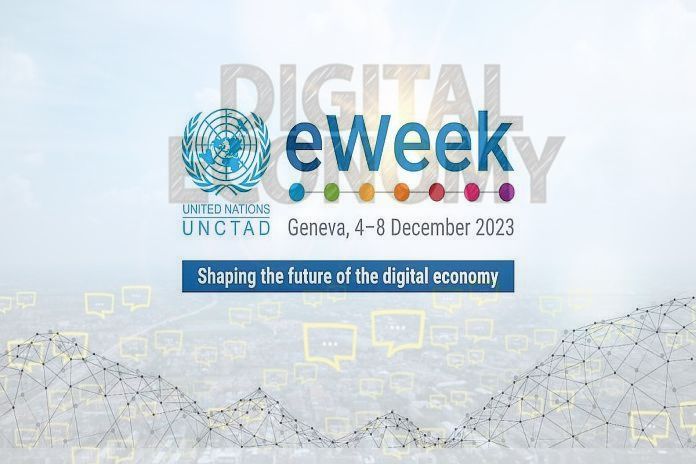– NCTAD eWeek 2023 issues a rallying call to help developing countries unlock their potential in the digital economy for a more inclusive future.
GENEVA, Switzerland – Rapidly advancing the digital economy in developing countries has become “an undeniable need” that requires stronger collaboration and capacity-building, political and business leaders heard at UNCTAD eWeek 2023 underway in Geneva through 8 December.
The rise of digitalization has seen businesses and consumers increasingly move online, but not all countries are equally positioned to benefit.
In least developed countries (LDCs), for example, only an average of 6 percent of people shop online compared to 62 percent in advanced economies. Also, less than half the population in LDCs can access 4G mobile network coverage, which is crucial for supporting digital trade.
A recent UNCTAD report also underscores the urgent need to expedite e-commerce enabling reforms and investments, and to scale up international support to realize the digital economy’s potential in developing countries.
“Creating thriving digital economies in developing countries is far from finished,” UNCTAD Deputy Secretary-General Pedro Manuel Moreno told a high-level eWeek session on 4 December, themed “Fast-tracking a digital economy future in developing countries”.
“It requires actions from us all to ensure that the digital revolution becomes more inclusive and can deliver vast development outcomes.”
Overcoming e-trade barriers
To build a digital economy that works for all, UNCTAD leverages ongoing eTrade readiness assessments, a key programme under the eTrade for all initiative supported by over 30 global development partners.
The assessments help developing countries, particularly LDCs, identify opportunities, barriers and policy solutions to drive digital transformation and e-commerce development under seven pillars.
These pillars include e-commerce strategies, legal and regulatory frameworks, trade facilitation and logistics, information and communications technology (ICT) infrastructure, payment solutions, skills development and access to finance.
So far, 36 countries have benefitted from the assessments and 28 of them have developed or plan to develop a national strategy or action plan to mainstream e-commerce into national development agendas.
The assessments highlight that closer international cooperation remains key to reducing the underfunding facing developing countries while scaling up their digital capabilities.
“There is still significant scope for more involvement of the larger community of development partners and donors,” said Shamika N. Sirimanne, UNCTAD director of technology and logistics. A much-reinvigorated impetus is needed in supporting the implementation of priority recommendations, as much as enhancing countries’ capacities for efficient and effective policy coordination.”
Four new assessments with country-specific insights
eWeek 2023 featured assessments of how four developing countries – Peru, Ghana, Mauritania and Mongolia – fare in their eTrade readiness.
For Peru, UNCTAD notes the country’s progress in deploying digital connectivity infrastructure and introducing regulatory reforms to encourage competition, reduce fees and enhance quality.
The assessment also recommends ways to help the South American nation develop its e-commerce logistics market and achieve greater financial inclusion through electronic payment adoption.
Ghana’s assessment highlights the nation’s strong potential for e-commerce following large investments in ICT infrastructure, which boosted internet penetration and financial inclusion. The country intends to develop a national e-commerce strategy to leverage these prospects.
In Mauritania’s assessment, UNCTAD offers a policy toolkit for operationalizing the country’s ambitious National Digital Transformation Agenda 2022-2025.
Mongolia’s assessment focuses on improving ICT skills, cross-border payment options, trade logistics and trade facilitation in the landlocked nation. Mongolia has a relatively well-developed ICT infrastructure but is still in the initial phases of e-commerce development.





